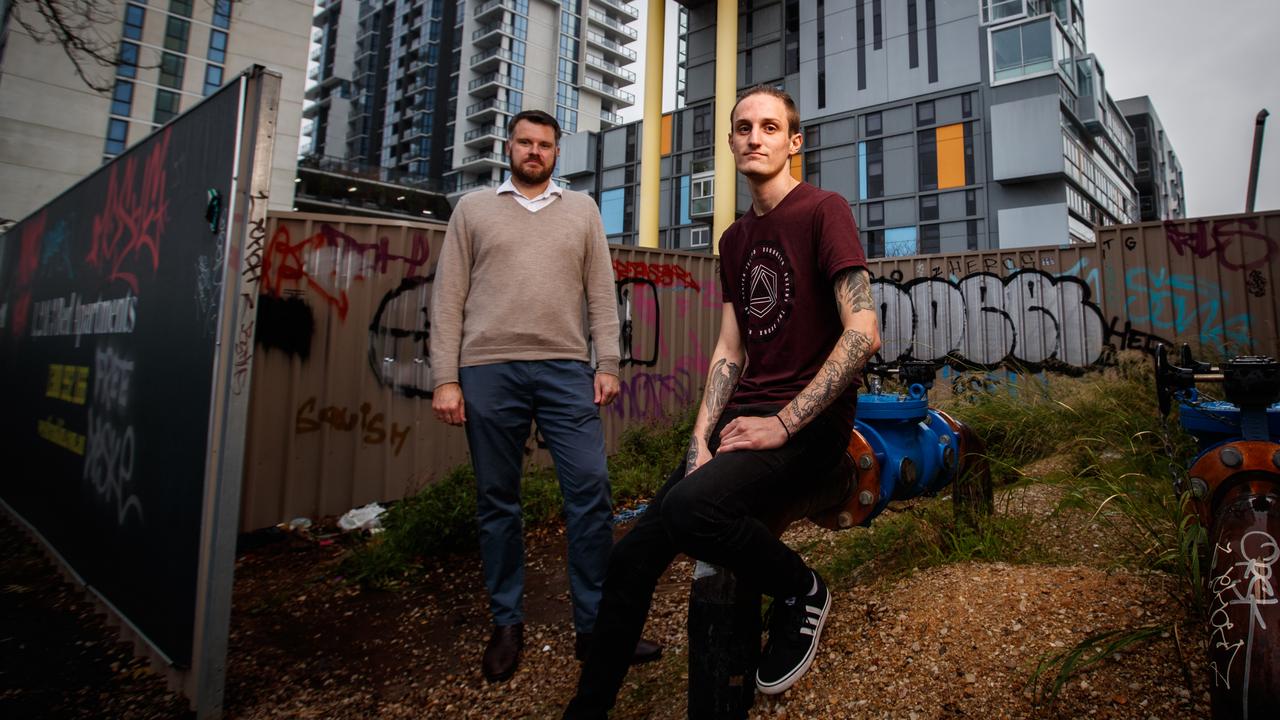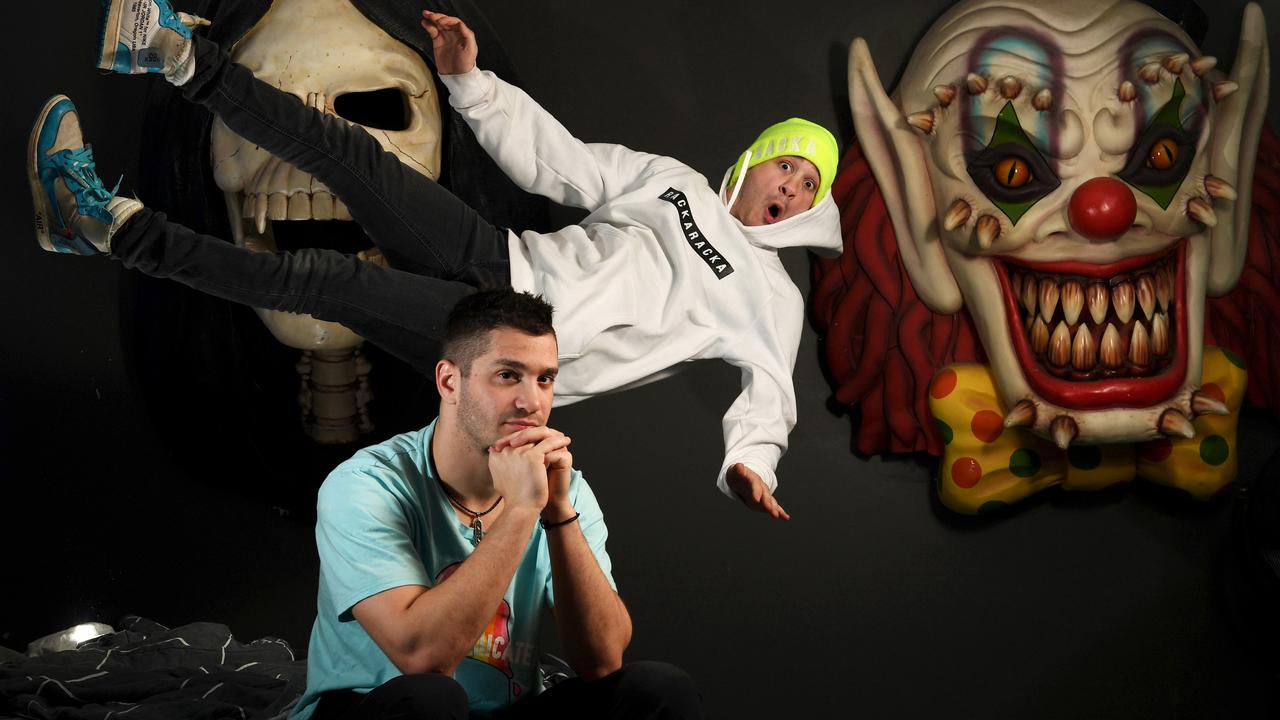Gone Girl producer Bruna Papandrea hasn’t forgotten her SA roots as she pushes for a stronger female presence in Hollywood
HOLLYWOOD producer Bruna Papandrea has come a long way since her school days at Elizabeth’s Fremont High – and she couldn’t be more proud of her roots.
SA Weekend
Don't miss out on the headlines from SA Weekend. Followed categories will be added to My News.
THE last time Bruna Papandrea was in Adelaide, she went back to her old school, Fremont High in Elizabeth. Her career as a Hollywood producer was on the fast track and Gone Girl, the hit thriller she made with business partner and actor Reese Witherspoon, had just been nominated for the 2015 Academy Awards.
She looked at the streetscape where Fremont High no longer stood and almost cried. The northern suburbs school, with its committed teachers and support for the arts, had been her ticket out of a disadvantaged childhood and now it was gone.
“It’s kind of been torn down and no longer exists,” says Papandrea. “It almost brought a tear – my grandparents used to live across the road.”
Her voice has a Californian twang, a byproduct of her daily work as a dealmaker in Los Angeles where she lives, near Venice Beach, with her husband, American producer Steve Hutensky, and their four-year-old twins, Avalon and Roman.
As half of the high-profile company she set up with Witherspoon five years ago, the 45-year-old has made huge waves with a gender agenda that seeks out projects featuring complex women – meaning troubled and sometimes difficult – in lead roles. Forget about women who are nice; their joint purpose has been to explore female empowerment in all its forms. Gone Girl, with its sinister halfway reveal, had a budget of $61 million and made an estimated $496 million worldwide. Wild, about a divorced reformed drug addict on a 1400km trek to redemption, was nominated for two Oscars in 2015 and made about $50 million.
Papandrea has another 23 films in various stages of production and is one of the most amazing success stories to come out of Adelaide this side of Sia. She is by far our biggest Hollywood name who no one has heard of.
To have risen to such heights from humble beginnings, one of three children brought up by their mother in a Housing Commission home in rough-edged Elizabeth, makes her story all the more compelling. She referred to it with pride last year at a gala red carpet event in Los Angeles when she accepted the Australians in Film award for people who have paved the way for others.
“I grew up with a single mother, very poor in a housing estate house, and sometimes I stand in the room in Hollywood and think, ‘What am I doing here? How did I get here?’,” she said as her mother Maria listened from the audience. “I think that’s important for people to know.”
She has no memory of deliberately planning her escape from the environment in which she was raised and says you don’t think like that when you’re young.
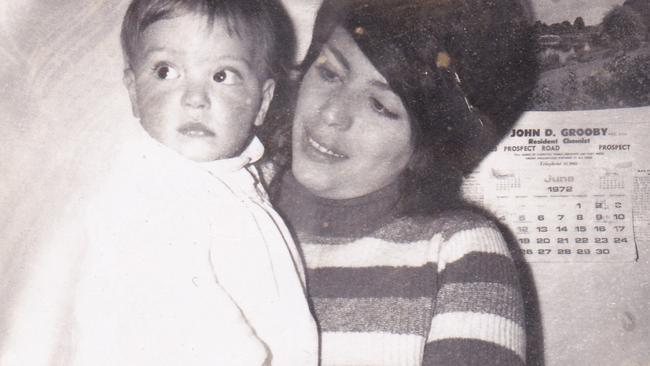
”We struggled financially but I had a very close Italian family so I always felt a lot of family support and love even though our circumstances were rough,” she says. “We always had food on the table.”
At school, she was dux or close to it, and remembers being fascinated when film producer Cristina Pozzan came to Fremont to make a documentary about their school musical going to Melbourne. It was her first exposure to the movie business.
“I thought, ‘Wow, these people do this for a living, this is amazing’,” she says. “I kind of stayed in touch with Cristina, we stayed pen pals.”
Thirty years later they are producing a movie together but, at the time, Papandrea just wanted to be (60 Minutes reporter) Jana Wendt. She got into Melbourne University doing commerce and law, a public school girl in a sea of college kids and dropped out after six months. In pursuit of something more creative, she went to Adelaide University and studied arts including French, Italian and Spanish. Outside of uni, she did a workshop with a bilingual theatre company who wanted a young girl from an Australian-Italian background and, from that in the early 1990s, she volunteered to help behind the scenes at the Adelaide Festival of Arts. Her exposure to arts at this level changed everything for her, like the best Adelaide Festivals should.
“Those festivals were mind-blowing, I mean, the best people in the world came to see them,” she says.
She returned to Melbourne and started writing plays – bad ones, she says – with a new purpose of finding a place for herself in the thrilling world she had glimpsed. Along the way, she was consistently helped by people who opened doors for her and you can see why. There is something very smart and likeable about Papandrea and it has served her well. She has an obvious gift for production but only got to display her talents because people liked her.
“Why did you take me on?” she asked the venerated British film director Anthony Minghella who won the Academy Award for The English Patient and who hired the young Papandrea to run the London office he was opening with director Sydney Pollack. “Honestly, I knew we would have fun,” he told her. “I knew you would make me laugh every day and you’re smart.”
One of her Australian mentors was friend and playwright, UK expatriate Stephen Sewell, who encouraged her to apply for acceptance into the Young Playwrights of Australia. He also introduced her to cameraman and producer Dion Beebe who, with his wife, director Unjoo Moon, had a production company and they hired Papandrea to work on commercials. Before long she was producing commercials for Moon and getting to know the industry.
She was slowly finding her feet. With a friend, she funded her first short film, Three Chords and a Wardrobe – the story of an indulgent rock star wannabe played by Marcus Graham already had Papandrea’s signature feminism wrapped up as entertainment – then went to New York where she volunteered on an independent movie in return for a production credit. Called Lifebreath, it starred friend Gia Carides (then married to ex-Adelaide actor Anthony LaPaglia) and Luke Perry from Beverly Hills 90210.
Back in Australia, another friend opened the door to her production career. Robert Connolly, whose recent work includes Paper Planes with Sam Worthington, handed her a film he didn’t have time to do. Called Better Than Sex, it starred Susie Porter and David Wenham and it gave Papandrea the kind of grounding in the film industry that Australians are cherished for overseas.
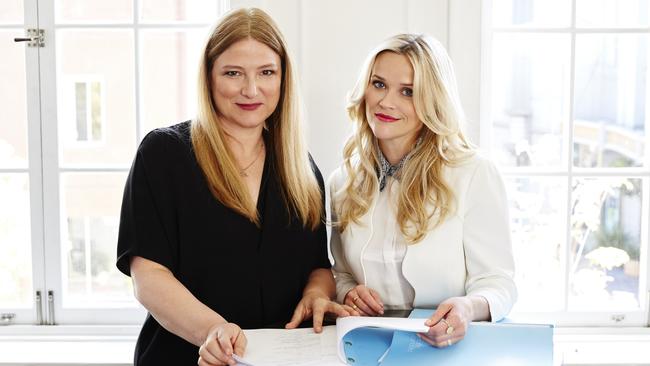
“The way you make movies in Australia, especially those with low budgets, you end up doing everything,” she says. “I was driving the actors to work; I was making curtains for the production office. Australian producers are so gifted because, when they come to the US, they have a great knowledge about how the whole process works.”
Connolly was a consultant and gave her tips on bringing in a film on a budget of less than $1 million. It released on the festival circuit which brought her to London, where Minghella had earlier told her to come and see him. She gave him a call.
“He could have hired a million people but I was the least expensive and he thought I had a nice smile and was a bit of fun,” she says, still slightly amazed. “It was my first real job and everything else kind of happened from there really. It was the biggest break in my career.”
Papandrea was taking control. Through Minghella and Pollack, she became executive producer on the 2008 dual Oscar-winning film starring Sean Penn, Milk, about the struggles of a gay activist. It had a $20 million budget and made $1.5 million in the US on its opening weekend. It was her first taste of real success.
After Minghella and Pollack died in 2008, Papandrea moved to Los Angeles and began producing under her own name. Her first two projects included Not Suitable For Children, an Australian comedy about a man’s looming infertility which starred Adelaide’s Sarah Snook; and Warm Bodies , which coincidentally gave a career break to another Adelaide talent, a young Teresa Palmer. The adapted zombie love story was also a sign of her successful business model of obtaining rights to an interesting book and bringing it to the screen.
Things were bubbling along and she was happy. “I had my own production company so I wasn’t really looking for anything,” she says.
In 2012, Papandrea sat next to Witherspoon at a dinner party at the home of Isla Fisher, the former Home and Away star whose recent films include Nocturnal Animals, and her husband Sacha Baron Cohen. Papandrea could hardly believe it when Witherspoon told her she wasn’t being offered interesting scripts. They talked about working together to create more roles for women, but Papandrea was reluctant to formally commit because she was doing well anyway and was wary that Witherspoon might want to use it as a vanity vehicle.
But when the former star of Legally Blonde sent her Cheryl Strayed’s Wild, an unorthodox story featuring an anti-heroine, she decided she was serious. “She sent it probably a month later, when I was filming Warm Bodies in Montreal,” says Papandrea. “It was really that conversation – do you want to do it with me? – that was the beginning of that partnership.”
The more they talked, the more they realised how aligned they were in their tastes and their commitment to putting women bad and good, front and centre. They were also not interested in making women’s films as such; they were to be adventures or dramas biographies or zombie stories that happened to have women in them. At around the same time they secured rights to Wild, they also got Gillian Flynn’s Gone Girl which they bid for before it was even published, let alone a bestseller.
They are both avid readers, Witherspoon so much so she has her own Instagram book club (#RWbookclub) with 5.7 million followers to promote books that she may have optioned, or that she read and liked. They became used to working fast, responding quickly and running a tiny office with a minimum of staff. Bidding wars were a distraction but they were also inevitable, although Papandrea prefers to find a novelist she likes then work with them as projects come through. The bond of sisterhood between her and Witherspoon strengthened when, almost as soon as their partnership was formalised into the company Pacific Standard, they both became pregnant, Papandrea with twins. Having children – Witherspoon also has an older daughter, Ava, from her marriage to Ryan Phillippe – put the organisational skills of both women to the test and had no discernible impact on their success.
“Pregnant women get a lot of stuff done,” Witherspoon said in a television interview. “You’re incubating a human being to accomplish things, and in a way we sort of incubated the company and brought it to life while we were having kids.”
Papandrea thinks it’s no coincidence that the most successful years of her career have coincided with pregnancy and motherhood. Having a daughter also made Papandrea even more of a feminist who wanted to change the male-centric world in which her son and daughter would live.
“Obviously Reese had an agenda because, as an actor, there should have been more opportunities,” she says. “For me, I was friends with a lot of actresses and I was sick of reading about how there weren’t roles for them. So it just happens to be a huge part of my brand, and of hers.”
On top of the pressures of work, Papandrea also struggles at times with the auto-immune disease lupus, in which the body turn on itself and attacks healthy tissue causing pain and inflammation. Diagnosed in 2010, she manages it through diet and exercise and two years ago she accepted a Women of Achievement award from Witherspoon at an LA Bag Ladies Lunch – they auction 300 designer bags for charity – for her support of Lupus LA. It takes its toll and she is frank about how demanding juggling illness, parenthood and a brilliant career can be.
“It’s hard, I won’t lie – I do not look like Ivanka Trump,” she says. “I look like I think most working mothers do, which is exhausted all of the time. You know I want to make a T-shirt that says ‘This is What Working Mothers Really Look Like’. It’s been challenging.”
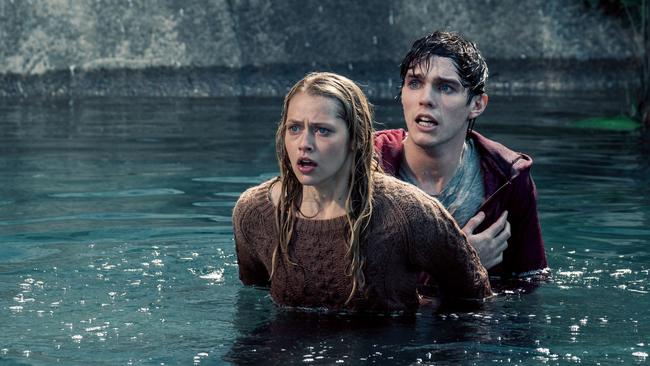
The female-friendly film partnership has made them international spokeswomen for inequality in the movie industry and in Hollywood Papandrea is known as the Australian who is helping Witherspoon change the world for women. They appeared together regularly at events talking about the need for more women as actors, producers, directors and anything from camera operators down. In August, Papandrea was in Australia for the Gender Matters industry networking conference in Sydney, then was back again in Melbourne in November as keynote speaker at the high-profile Screen Forever industry conference, talking about sexism.
There is no sign of blood on the floor but, after five years together and more than $1 billion in film sales, two months ago Papandrea and Witherspoon parted ways. Both are still committed to the female agenda but they are heading off on different paths. Witherspoon has a new mega-company, Hello Sunshine, formed in partnership with media giant AT & T internet and mobile company and the Chernin Group, a major media investor. It will do film and TV but with a new focus on streamed – mobile and television – female-friendly content.
Papandrea is forming a smaller, more tailored film production company whose details are yet to be announced. There’s a lot going on behind the screens, she says, so watch this space.
“I think ultimately in the bigger picture we both have big ambitions for what we want to do individually,” she says. “I can’t talk for what she’s doing but I will soon announce my new company which will hopefully keep building on what I’ve already created.”
In the wake of the split they have paid each compliments, Papandrea calling it a great five years together and Witherspoon calling Papandrea hardworking and extremely talented.
“I’m happy to further collaborate with her on the strong slate of Pacific Standard properties,” Witherspoon said in a statement.
They have a stream of projects in the pipeline, among them Ashley’s War about an all-female team in Afghanistan, and Barbie and Ruth about the co-founder of Mattel who invented the Barbie doll and became an AIDS activist. Their latest project is an HBO television series called Big Little Lies whose star-studded cast includes Nicole Kidman, Shailene Woodley, Zoe Kravitz and Laura Dern. Taken from the novel by Sydney author Liane Moriarty, whose books are bestsellers in the US, it has been relocated to Northern California and has not one but five women at its heart.
“I am really proud of it: it’s about female friendship and the secrets that people hold,” Papandrea says. “All of these women have incredible roles and it’s great to be able to tell a story of this group of women over seven hours, and not two.”
There are other joint projects to work their way through on the Pacific Standard slate, including a Peter Pan spin-off, Tinker Bell, with Witherspoon attached as an actor, and Truly Madly Guilty, another Moriarty novel about three married couples and a backyard barbecue that goes horribly wrong.
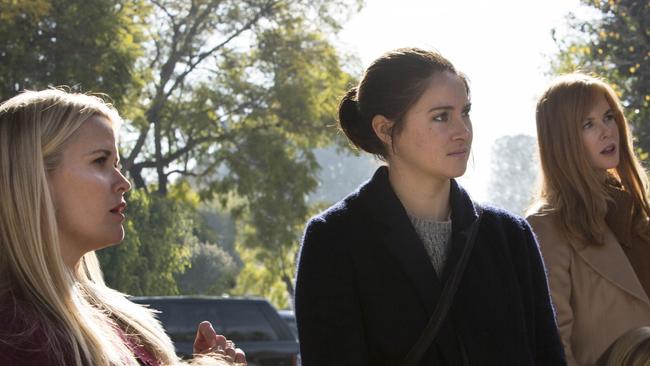
But she is already thinking ahead to how on her own she will be freer to bring projects closer to home, possibly even to South Australia. She loves and misses Australia and is on the brink of announcing a film with a major Australian filmmaker. Behind the scenes, she is quietly moving on in a direction that will make her more Australian based.
“I might even come to South Australia one day,” she says. “There are great incentives there and great studios and the people running the SAFC are really great, so I would love to do that.”
She still comes back to South Australia, although not as much as she did when her grandparents were alive. Her mother Maria moved to Melbourne about three years ago where her sisters Marcella and Rachel also live, but her brother John is still here, as are aunts and cousins and other extended family.
The break with Witherspoon was dramatic but it has liberated Papandrea to pursue a stronger Australian agenda in her work. She calls herself the proudest Australian you will ever meet and she has the muscle to deliver serious Hollywood action to the doors of the Australian industry. And she sounds keen to do it, telling the Screen Australia conference she wanted to be the next Baz Luhrmann and make movies in Australia no matter what the topic.
“I would really love to come and make a big American movie here,” she says. “I’m going to work here a lot if I can. That’s my ideal. If I can make things between California and here, I’ll be very happy.”

